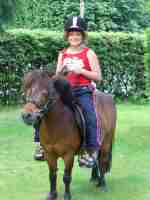I'm sitting in a chair in the side lawn at Mosegaarden, Ole and Vibeke's country place outside of Odense. It's 23 deg (Centigrade of course, this isn't backwards USA). My wife is sitting next to me in panties and a t-shirt, looking lovely as ever after these 25 years of marriage. Dozens of birds are singing in the trees around the yard, there are hordes of bicycle riders going by in pelatons and singly. I can hear the high speed eletric commuter train rolling by in the background. It makes only a steel on steel swish sound. The occasional car goes by, small, efficient, and relatively quiet. In the distance there are a dozen wind turbines turning lazily in the morning breezes.
The horses are fed and Connor finished scrubbing out the watering troughs this morning. I also finished scything the brush from the east fence, a task I've enjoyed greatly.
The scythe is a magnificent example of agricultural intelligence. When swung smoothly, close to the ground it floats through thistle and nettle stems making little "ching ching" noises as it clips off the larger stems. I carry a small stone to maintain that edge as I work. You really can feel it when it needs a touch up. I occupied several mornings using it to clear the back horse fences of nettle and thistle while waiting for Marco Polo to finish his feed.
To get there, I spent a day tuning up the neglected scythe. It's a fine tool, Austrian made, light and well formed to the task. Having worked it over with an improvised anvil and hammer, the edge of the blade is just thicker than a piece of paper, bending slightly under pressure from a thumb nail. The final edge should be put on with a rounded hard stone swept across both sides of the blade with a gloved hand. Be careful, that blade is very sharp.
Anybody who's read Ernest Callenbach's Ecotopia books will immediately recognize the scene described here. Denmark is as close to Ecotopia as anyplace I've been. There seems to be a genuine concern for and appreciation of the fragility of the environment we need to survive on this planet. The social systems, especially health care and child support, while not perfect, appear to me to be the best anywhere on the planet. People really do use bicycle and mass transit in favor of the car. Consequently there is noticeably less traffic on the roads than anywhere, except maybe outback Australia.

After 9 months of travel involving a large variety of situations, this feels the most like home. We've been left to care for a small farm with 4 horses and assorted small furry critters. There's work to be done, friendly neighbors, bikes to ride, a marvelous kitchen to cook in, and wireless internet - Just like home. This situation is helping to get our head and hearts around the concept of being at home again.


